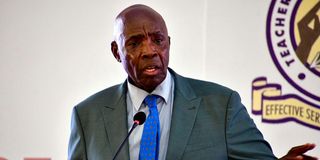Lobby seeks to halt ‘costly’ university loans funding plan

Education Cabinet Secretary Ezekiel Machogu.
What you need to know:
- First Year students in universities and Tvet institutions are awaiting outcome of the applications seeking government financial support.
- The applications for funding closed on September 7, 2023 and students are awaiting results of the classification and the amount they will receive.
The Kenya Human Rights Commission (KHRC) has filed a case at the High Court seeking to stop the Ministry of Education from implementing the funding model for higher education which was unveiled by President William Ruto in May.
The suit before the Constitutional and Human Rights Division comes as First Year students in universities and technical and vocational education and training (Tvet) institutions await the outcome of the applications seeking government financial support.
The other petitioners are Boaz Waruku, Elimu Bora Working Group and the Students Causus.
The petitioners argue that the Valuable Scholarship and Loan Funding (VSLF) model is “arbitrary, obscure, expensive, undefined and an illegality” and will breach the rights to education of some students. The model has replaced the maximum differentiated unit cost (DUC) model but only applies to First Year students. Continuing students will be funded under the DUC.
KHRC also argues that there was no public participation before the model was implemented as required by law. It argues that the First Year students who are affected by the model were never consulted on its suitability and that many have been forced to seek alternative sources of funding for their education.
“The funding model as is currently being implemented is exclusive and discriminatory against students whose family backgrounds are not covered by the narrow categories that the respondents have not even properly identified,” the suit reads.
The VSLF intends to classify students as vulnerable, extremely needy, needy, and less needy.
The applications for funding closed on September 7, 2023 and students are awaiting results of the classification and the amount they will receive.
Education Cabinet Secretary Ezekiel Machogu advised universities and colleges to admit students without demanding fees as the applications are processed.
The other respondents are the Higher Education Loans Board (Helb), the Universities Fund (UF) and Kenya Universities and Colleges Central Placement Service.
The petitioners also allege that by introducing the model, the government has made higher education expensive and transferred the bulk of its financing to students and their families “making tertiary education more expensive, instead of making it progressively free”.
They further argue that only Parliament has the power to make provisions that have the force of law. The VSLF was introduced following the recommendations of the Presidential Working Party on Education Reforms that was appointed by President Ruto last year.
“Universities’ funding is governed by the Helb and the UF, both statutory bodies that have their mandate spelled out clearly in statute. There is presently no statute upon which this funding model is based hence it has no legal feet upon which to stand,” the suit papers read.
KHRC, therefore, seeks to have the implementation of the VSLF, as it is currently, declared unconstitutional, null and void.
Meanwhile, First Year students in universities are reportedly struggling with life on campus after going for close to two months without disbursement of funds for their upkeep. Some institutions opened in late August while the majority opened early last month.
Although students were not required to pay tuition fees, their families have to support them to buy food and also to pay for accommodation for those residing off-campus. Equally affected are students who applied for admission to private universities as well as student loans.
“Life is not easy here without money. There’s been no word from Helb on when to expect the money in our accounts. Worse still, up to now I don’t know how much I will be given either as a scholarship or loan. It’s mental torture and one can hardly concentrate on studies,” a student told Nation.
The entire scholarship amount and student loan will be wired straight to the universities’ accounts while the upkeep loan will go to the students’ accounts.
It is estimated that about 21,814 students will fall under the vulnerable category, 23,372 are extremely needy, 26,488 needy and 84,140 less needy.
The maximum amount of students’ loans for upkeep is; vulnerable (Sh60,000), extremely needy (Sh55,000), needy (Sh50,000) and less needy (Sh45,000).




